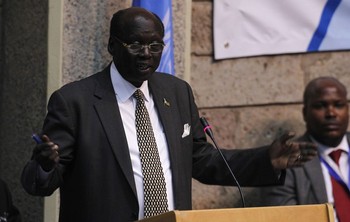S. Sudan denies conceding Abyei region to Sudan
March 22 , 2016 (JUBA) – South Sudan’s foreign affairs minister has denied reports that he authorised an official response to a United Nations Human Rights report on his country’s situation, which referred to natives of the oil-producing region of Abyei as non-South Sudanese.

“I would like to make a clarification because in the media it was quoted that the ministry of foreign affairs has said clearly that the people of Abyei are not South Sudanese. I would like to make it clear that the issue of Abyei is clearly stated that they have a joint sovereignty of the Republic of South Sudan and of the Republic of Sudan and any decision that is to be taken by the two governments, will rely on the people of Abyei decision through a referendum to decide which country they should belong to,” Barnaba Marial Benjamin told reporters in the South Sudan capital, Juba Tuesday.
“So the decision of Abyei nationality, whether they should belong to South Sudan or Sudan is purely of the nine Ngok Dinka that will decide, through a referendum,” he added.
According the minister, the status of Abyei, a contested region, is contained in the protocol of Abyei which the government of Sudan and South Sudan’s governing Sudan People’s Liberation Movement (SPLM) signed as part of the comprehensive peace agreement.
Marial said he was aware the inhabitants Abyei ethnically belong to South Sudan.
“We all know if you talk about the ethnicity of the Dinka of Abyei geographical and socially and culturally, you don’t get any Dinka outside the territory of South Sudan. This is known. They [Dinka] are not like other ethnic groups that may you find across the borders. We must know, even anthropologically, the Dinka are always known to be found in South Sudan,” said the South Sudanese foreign minister.
He further added, “So I would like to stress to my brothers and sisters of Abyei that the government, as ministry of foreign affairs, has never made such statement that denies the right of the people of Abyei according to Abyei protocol to which the government adhere to through the auspices of the former president of South Africa Mbeki through the African Union High Implementation Panel [AUHIP]”.
The minister said, Luka Biong, referred to in his response as a Sudanese national, was at once a minister in the president’s office just like many other sons and daughters of Abyei who are currently working within South Sudan government systems as nationals.
In its report, the UN said Biong’s dismissal from Juba university on the orders of President Salva Kiir violated his rights and freedoms. Biong, who headed a department at the state owned institution, had organized a public lecture to discuss the 28 new states.
“So really to dwell on this issue that the ministry of foreign affairs quoted in certain circles, has denied the presence of sons and daughters of Abyei in South Sudan is not correct. There is no such quotation,” stressed Marial.
“We are aware, we would like to make this very clear that it is reflected in the document both Sudan and South Sudan as signed during the days of the comprehensive peace agreement that they have a joint sovereignty over Abyei until the sons of the nine Ngok Dinka decide in a referendum which country they would belong to and that is what the government will insist to have,” he added.
The minister said South Sudan had not disowned the people from Abyei as perceived.
“So those sectors which are saying that we have thrown out the sons and daughters of Abyei are not true. That is why I have to call this special press conference so that we are clearly understood,” he said.
Marial, however, said South Sudan was still negotiating with Sudan, through the AUHIP, to ensure the issue of the oil-producing region is resolved peacefully through the rights of the people concerned.
MARIAL APOLOGISES
Meanwhile, Biong said he received a call from Marial, who reportedly apologised for what had transpired, while assuring him that government would prepare another official response to replace the one already dispatched to the UN human rights body.
He urged the natives of Abyei to use this as an opportunity to press the South Sudanese government into recognising the outcome of the community’s unofficial referendum, which was conducted in 2013. Sudan and South Sudan did not recongnise this referendum.
Biong said people should not to overact to the matter, but use it to “realize our strategic political objective of recognition of the outcome of the referendum and mobilize friends, people of South Sudan and civil society and all political parties to support the case”.
(ST)
